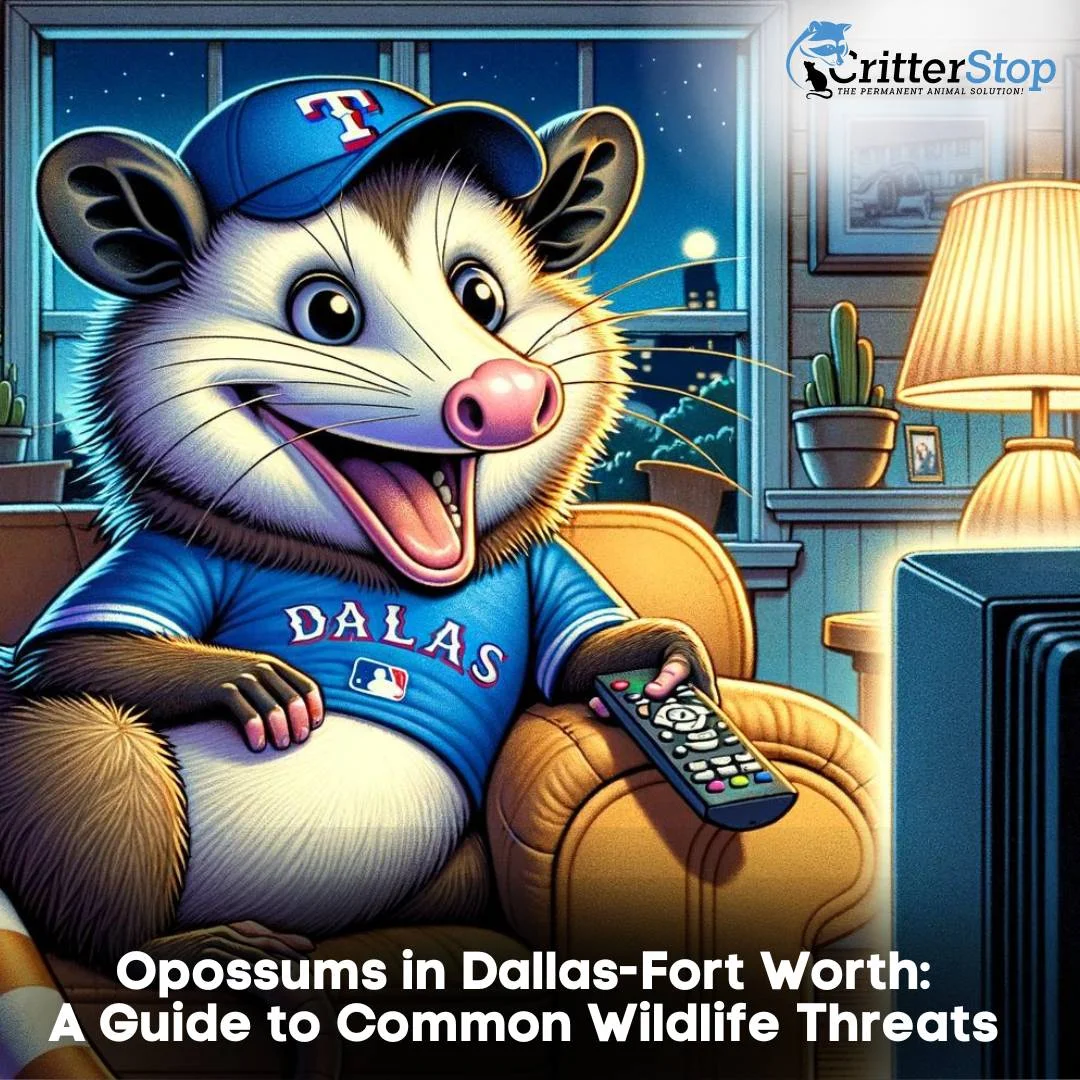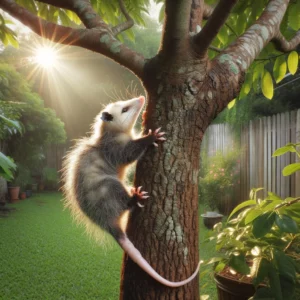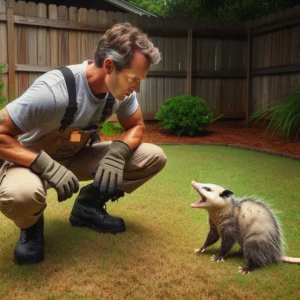
Opossums are a common sight in the Dallas-Fort Worth area, yet many residents remain uninformed about these intriguing creatures. In this comprehensive guide, we aim to unravel the mystery surrounding opossums and shed light on their behavior, role in the ecosystem, and potential threats they may pose. By understanding these factors, you will be better equipped to coexist with opossums and protect your property from potential harm.
Opossums are fascinating nocturnal creatures that have captured the curiosity of many. Primarily active during the night, these marsupials navigate their surroundings with remarkable agility. Much like their distant relatives, kangaroos, opossums carry their young in a pouch, providing them with a safe and nurturing environment.

These adaptable animals have managed to thrive in a wide distribution range, including urban, suburban, and rural areas. Their ability to adapt to different environments is a testament to their resilience and resourcefulness.
Contrary to popular belief, opossums are not aggressive creatures. In fact, they are generally docile and non-confrontational. When faced with a threat, opossums may resort to hissing, growling, or even "playing possum." This intriguing defense mechanism involves feigning death, fooling potential predators into thinking they are lifeless. It's a clever survival strategy that often leads to the misconception that opossums are dangerous.
However, it's important to remember that opossums are harmless and prefer to avoid conflict whenever possible. They would much rather go about their business, foraging for food and exploring their surroundings.
Opossums play a vital role in maintaining the delicate balance of our ecosystems. These remarkable creatures serve as nature's pest controllers, helping to control populations of insects, rodents, and other pests that can wreak havoc on our environment.
Equipped with sharp senses and excellent foraging skills, opossums have a diverse diet that includes insects, rodents, fruits, and vegetation. By consuming these various food sources, they help regulate pest populations, preventing them from reaching harmful levels. This natural pest control service provided by opossums is invaluable in preserving the health and harmony of our local ecosystems.
But their contributions don't stop there. Opossums possess a unique immunity to venomous snake bites, making them an unlikely hero in the face of danger. Their fearless scavenging behavior also plays a crucial role in reducing the spread of diseases caused by decaying animals. By cleaning up carrion, opossums help prevent the proliferation of harmful pathogens, ensuring the well-being of other wildlife and even humans.
It's truly remarkable how such a seemingly unassuming creature can have such a significant impact on the intricate web of life. Opossums are nature's unsung heroes, silently working behind the scenes to maintain the delicate balance of our ecosystems.
One common misconception about opossums is that they carry and transmit diseases such as rabies. However, opossums have a low body temperature, making them resistant to the rabies virus. Additionally, they have a strong immune system that helps ward off various diseases.
Contrary to popular belief, opossums are actually quite beneficial to the environment and human health. These fascinating creatures are nature's little clean-up crew, as they have a diet that primarily consists of insects, rodents, and other pests. By feasting on these creatures, opossums help control the population of disease-carrying pests, reducing the risk of diseases spreading to humans and pets.
Another interesting fact about opossums is their unique ability to resist venom. Yes, you read that right! Opossums have a natural resistance to snake venom, which means they can withstand bites from venomous snakes that would be fatal to other animals. This remarkable adaptation not only protects opossums but also helps keep snake populations in check, maintaining a delicate balance in ecosystems.
While it is important to take precautions when handling any wildlife, it is unlikely for opossums to pose a significant health risk to humans or pets. Understanding the facts can alleviate unnecessary concerns and foster greater appreciation for these unique creatures.

If you find opossums frequenting your property, it is essential to identify the factors that attract them. Opossums are opportunistic feeders, often drawn to easily accessible food sources. Bird feeders, unsecured trash cans, and pet food left outdoors can all act as lures for opossums.
When it comes to bird feeders, opossums are not picky eaters. They will happily feast on the seeds and grains meant for our feathered friends. Their nimble paws and agile nature allow them to climb up poles or trees to reach the bird feeders, making it a convenient and reliable food source for them. However, this can be problematic for bird enthusiasts who want to attract a variety of avian species to their yards.
Unsecured trash cans are another temptation for opossums. These resourceful creatures can easily knock over a trash can and rummage through its contents in search of a meal. They have a keen sense of smell and can detect the scent of food from a considerable distance. Once they find a food source, they will not hesitate to take advantage of it, often leaving a mess behind.
Similarly, pet food left outdoors can attract opossums. Whether it's a bowl of kibble left for a cat or dog, opossums will gladly help themselves to the tasty meal. It is important to remember to bring in pet food after your furry friend has finished eating to avoid attracting unwanted wildlife.
Furthermore, dense vegetation and cluttered areas provide safe shelter and potential nesting sites for opossums. These adaptable creatures can make themselves at home in various environments, including overgrown gardens, woodpiles, and even abandoned structures. By addressing these attractants, you can minimize the likelihood of opossums making your property their home.
When it comes to dense vegetation, opossums find solace in the cover it provides. They can easily hide from predators and feel secure in these areas. Additionally, cluttered spaces, such as piles of leaves or debris, offer opossums the perfect hiding spots and potential nesting sites. Taking the time to declutter and maintain your property can deter opossums from choosing it as their habitat.
It is important to note that opossums are not inherently harmful or dangerous. They are generally non-aggressive and prefer to avoid confrontation. However, if they feel threatened or cornered, they may hiss, growl, or even play dead as a defense mechanism. If you encounter an opossum on your property, it is best to give them space and allow them to move on.
Opossums are adaptable creatures capable of thriving in various environments. While they are commonly found in forested areas and rural landscapes, they have also successfully adapted to urban and suburban settings in Dallas-Fort Worth.
In urban areas, opossums utilize the protective cover provided by trees, bushes, and dense shrubbery, while in more rural habitats, they may rely on natural structures such as tree hollows or abandoned burrows. Their ability to adapt to diverse landscapes contributes to their success as a species.
If an opossum has become a nuisance on your property, it is important to remember that these creatures play a vital role in the ecosystem and should be approached with care. Humane removal techniques involve discouraging opossums from reentering your property without causing them harm.
Some effective methods include sealing entry points, installing motion-activated lights or sprinklers, and removing attractants. By implementing these strategies, you can encourage opossums to relocate to more suitable habitats while ensuring their well-being.
In certain situations, seeking professional assistance for opossum control may be necessary. This is particularly true if the opossum displays aggressive behavior, poses a threat to human safety, or if opossums are causing extensive damage to property or infrastructure.
Certified wildlife experts possess the knowledge and experience to safely remove opossums, ensuring the well-being of both humans and wildlife. They can assess the situation, implement appropriate removal strategies, and provide guidance on preventing future encounters.

One of the most effective ways to prevent opossums from becoming a regular visitor to your property is to secure your trash properly. Opossums are attracted to easily accessible food sources, and unsecured garbage bins provide an enticing buffet.
Consider using locking or tamper-proof containers, and ensure that lids are tightly secured. Additionally, placing trash cans in enclosed areas or utilizing wildlife-proof containers can further deter opossums and other wildlife from accessing your waste.
Making your yard less appealing to opossums involves minimizing potential habitats and food sources. Trim overgrown shrubs and trees to eliminate hiding spots, and clear away debris or clutter that could serve as potential nesting sites.
Furthermore, storing pet food indoors, avoiding intentional feeding of wildlife, and closing off access to crawl spaces or underneath structures can help deter opossums from taking up residence in your yard.
By gaining a deeper understanding of opossums and their behavior, we can appreciate the vital role they play in our local ecosystems. Implementing effective prevention and humane removal techniques allows us to coexist with these fascinating wildlife neighbors, ensuring a harmonious balance between humans and nature in Dallas-Fort Worth.